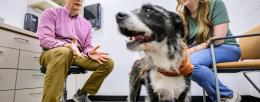News Archive
Flightpath Biosciences licenses microbiome-sparing antibiotic developed at Illinois
Diana Yates
Flightpath Biosciences, Inc., a clinical stage biotechnology company focused on the development of precision therapeutics targeting bacterial pathogens, has licensed a class of…
IGB Profile: Umnia Doha
Katie Brady
As a PhD student in mechanical engineering, Umnia Doha spent hours imaging 3D tissue scaffolds on the confocal microscopes in the Carl R. Woese Institute for Genomic…
Stephen Long recognized as 2025 World Food Prize Top Agri-Food Pioneer
Marianne Stein
Stephen Long (BSD/CAMBERS/PFS), Ikenberry Endowed Chair Emeritus of Plant Biology and Crop Sciences at the University of Illinois Urbana-Champaign, has been selected as a…
In challenging times, a legacy of mentorship and kindness lives on
Claudia Lutz
Eric Jakobsson, an integral member of the University of Illinois and Champaign-Urbana communities for 50 years, is remembered for his legacy of kind and thoughtful leadership.…
How are veterinarians advancing cancer research in dogs, and people?
Diana Yates
People are beginning to realize that dogs share a lot more with humans than just their homes and habits. Some spontaneously occurring cancers in dogs are genetically very…
Manipulation of light at the nanoscale helps advance biosensing
Katie Brady
Traditional medical tests often require clinical samples to be sent off-site for analysis in a time-intensive and expensive process. Point-of-care diagnostics are instead low…
Self-driving lab: AI and automated biology combine to improve enzymes
Liz Ahlberg Touchstone
By combining artificial intelligence with automated robotics and synthetic biology, researchers at the University of Illinois Urbana-Champaign have dramatically improved…
Fruit fly study reveals a gene’s hidden ability to keep regrowth on the right track
Claudia Lutz
Regeneration, the ability to heal damaged or lost tissues, is both everyday and a real-life superpower. Health research inspired by the remarkable regeneration of animals like…
Awards recognize excellence in public engagement
Thomas Bruch
Individuals and teams from the University of Illinois Urbana-Champaign who have made a visible impact on society were recently recognized with the 2025 Campus Awards for…








